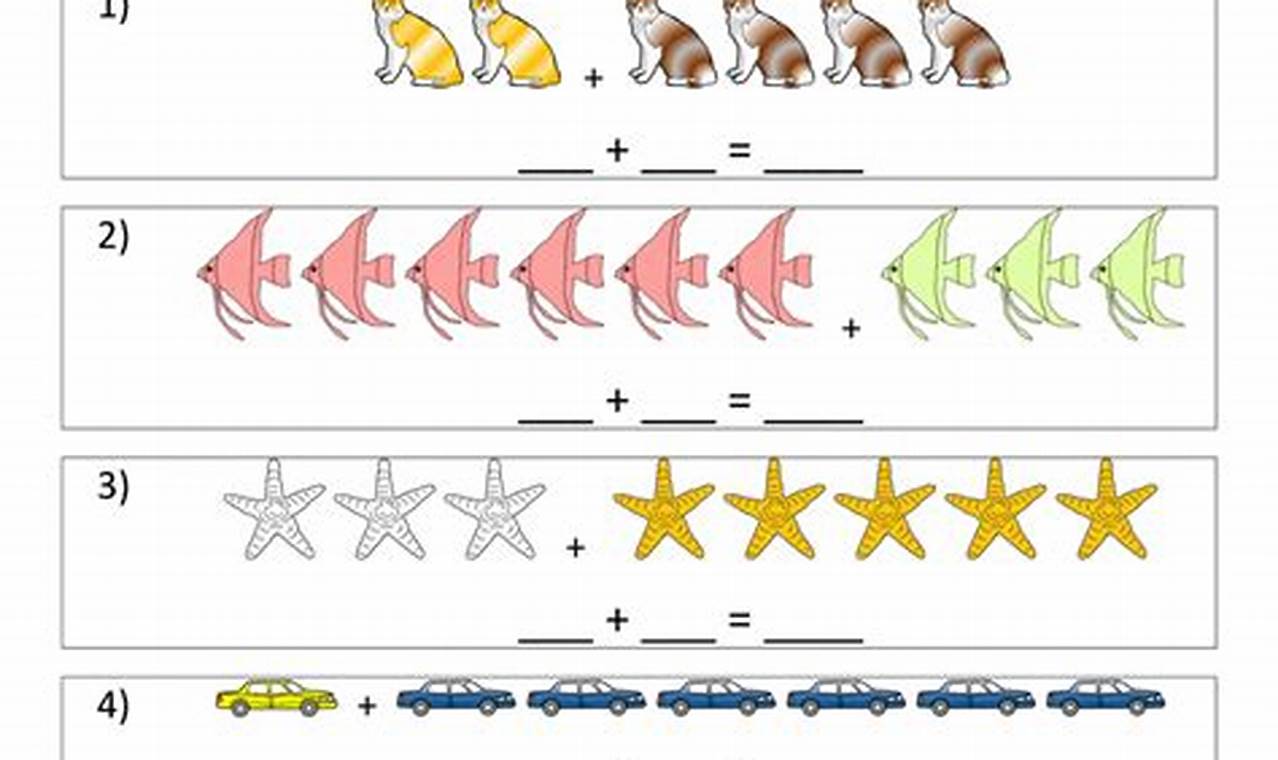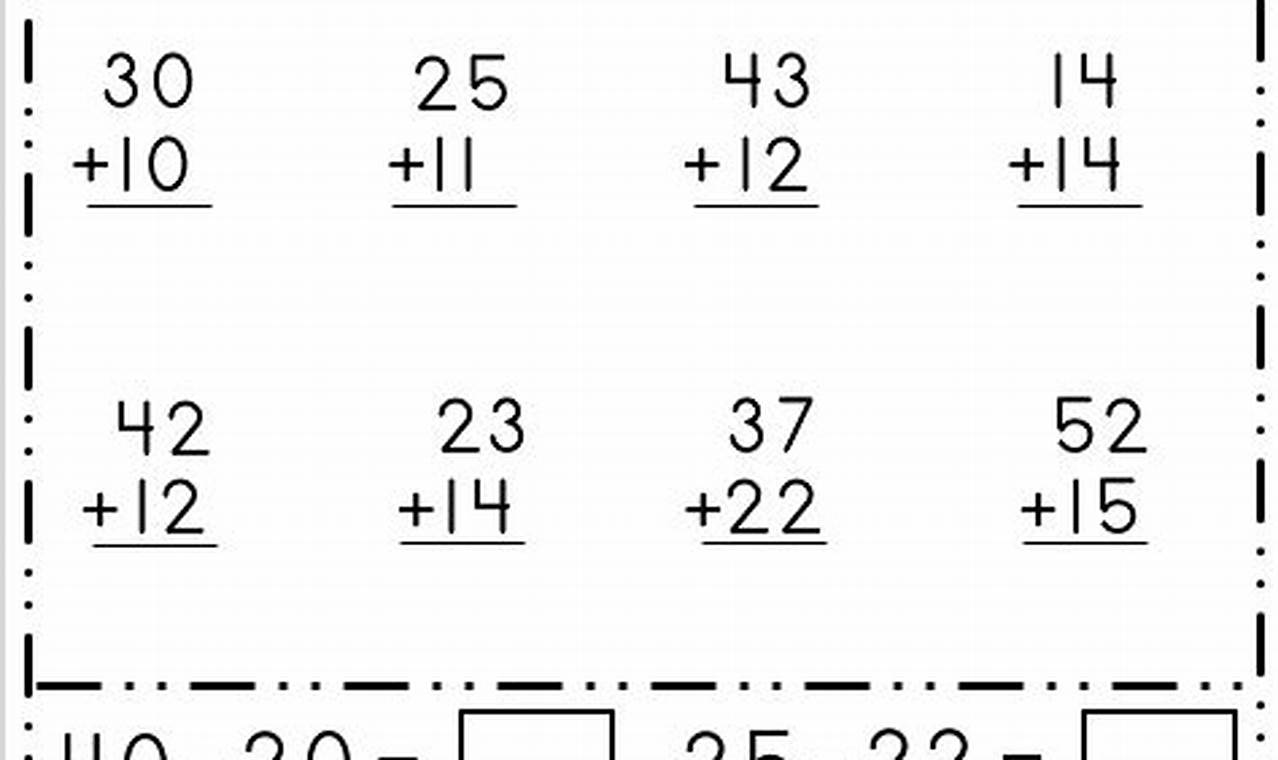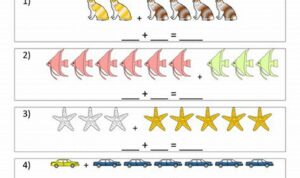Addition worksheets for first graders are educational tools designed to help young learners practice and improve their addition skills. These worksheets typically include a series of simple addition problems, each consisting of two numbers that the student must add together to find the sum.
Addition worksheets for first graders are an important part of early mathematics education. They help students to develop a strong foundation in basic arithmetic and prepare them for more advanced math concepts in the future.
These worksheets can be used in a variety of settings, such as in the classroom, at home, or even on the go. They are a valuable resource for both teachers and parents who want to help their children learn and grow.
Addition Worksheets for First Graders
Addition worksheets for first graders play a crucial role in developing their mathematical abilities. These worksheets typically involve:
- Basic Arithmetic: Addition worksheets provide practice with fundamental addition operations, helping students build a solid foundation in arithmetic.
- Problem Solving: Solving addition problems encourages critical thinking and problem-solving skills, essential for future mathematical endeavors.
- Number Recognition: Addition worksheets reinforce number recognition and place value concepts, laying the groundwork for more complex math.
Moreover, addition worksheets can be tailored to individual student needs, providing targeted practice areas. For instance, worksheets with larger numbers challenge students to extend their understanding, while those with visual aids support learners who benefit from visual cues. By incorporating addition worksheets into their lessons, educators can effectively enhance students’ mathematical proficiency, preparing them for future academic success.
Basic Arithmetic
In the context of “addition worksheets for first graders,” basic arithmetic serves as the cornerstone for developing a strong mathematical foundation. These worksheets provide ample opportunities for students to practice and master fundamental addition operations, which are essential building blocks for more complex math concepts.
- Building Number Sense: Addition worksheets introduce the concept of combining quantities, reinforcing number sense and place value understanding. By manipulating numbers and visualizing the process of addition, students develop a deeper comprehension of number relationships.
- Developing Computational Fluency: Repeated practice with addition problems enhances computational fluency, enabling students to perform mental math operations quickly and accurately. This fluency serves as a springboard for solving more complex problems efficiently.
- Problem-Solving Skills: Addition worksheets often present word problems that require students to apply their addition skills to solve real-world scenarios. These problems foster critical thinking and problem-solving abilities, preparing students for encountering various mathematical situations.
Overall, the emphasis on basic arithmetic in addition worksheets for first graders lays the groundwork for mathematical proficiency. By mastering these foundational skills, students gain the confidence and competence necessary to tackle more advanced mathematical challenges.
FAQs on Addition Worksheets for First Graders
Addition worksheets for first graders are widely used educational tools, and as such, they often give rise to common questions and concerns. This section aims to address some frequently asked questions, providing informative answers to support understanding and effective utilization of these worksheets.
Question 1: Why are addition worksheets important for first graders?
Addition worksheets play a crucial role in developing foundational mathematical skills in first graders. They provide practice in basic arithmetic operations, reinforce number recognition, and foster problem-solving abilities. By engaging with these worksheets, students build a solid understanding of addition, which serves as a stepping stone for more advanced mathematical concepts.
Question 2: How often should first graders practice addition using worksheets?
The frequency of practice depends on individual student needs and progress. However, regular practice is essential for building proficiency. Daily or alternate-day practice sessions of 15-20 minutes can be beneficial. Consistent practice helps reinforce concepts and aids in retention.
Question 3: Are there different types of addition worksheets for first graders?
Yes, addition worksheets for first graders come in various formats to cater to diverse learning styles and abilities. Some worksheets focus on basic addition facts, while others incorporate word problems or visual aids to enhance problem-solving skills. Worksheets can also vary in difficulty level, providing opportunities for differentiation and targeted practice.
Question 4: How can parents support their first grader’s learning using addition worksheets?
Parents can actively support their first grader’s learning by providing a conducive home environment for practice. Encouraging regular worksheet completion, offering assistance when needed, and praising effort and progress can significantly boost the child’s confidence and motivation.
Question 5: What if my first grader struggles with addition worksheets?
If a first grader encounters difficulties with addition worksheets, it’s important to identify the underlying. This could be due to gaps in number recognition, lack of understanding of addition concepts, or insufficient practice. Providing additional support, such as one-on-one tutoring, breaking down problems into smaller steps, and using manipulatives, can help address these challenges.
Question 6: How can addition worksheets be made more engaging for first graders?
Making addition worksheets more engaging can enhance the learning experience for first graders. Incorporating colorful designs, incorporating game-like elements, and providing opportunities for hands-on activities can spark interest and make practice more enjoyable. Worksheets that relate addition to real-world scenarios or incorporate storytelling elements can also foster a deeper understanding.
In summary, addition worksheets for first graders are valuable tools for developing essential mathematical skills. Regular practice, tailored support, and engaging activities can maximize the benefits of these worksheets, setting the stage for future mathematical success.
Transition to the next article section:The Benefits of Addition Worksheets for First Graders
Tips for Using Addition Worksheets for First Graders
Addition worksheets are a valuable tool for teaching and practicing addition skills. Here are five tips for using addition worksheets effectively with first graders:
Tip 1: Start with simple problems. First graders need to master the basics of addition before they can move on to more complex problems. Start with worksheets that focus on adding small numbers, such as 1 + 1 and 2 + 2.
Tip 2: Use visual aids. Visual aids can help first graders understand addition concepts. Use objects, such as blocks or counters, to represent the numbers being added. You can also use pictures or diagrams to illustrate the addition process.
Tip 3: Make it fun. Addition worksheets don’t have to be boring. Find ways to make practicing addition fun for first graders. You can use games, songs, or stories to engage their interest.
Tip 4: Provide plenty of practice. First graders need to practice addition regularly in order to become fluent. Provide them with plenty of opportunities to practice, both in and out of the classroom.
Tip 5: Be patient. Learning addition takes time and practice. Be patient with your first graders and don’t get discouraged if they don’t understand everything right away.
By following these tips, you can help your first graders learn addition skills and develop a strong foundation for future math success.
Summary of key takeaways or benefits:
- Addition worksheets are an effective tool for teaching and practicing addition skills.
- Starting with simple problems, using visual aids, and making it fun can help first graders understand addition concepts.
- Providing plenty of practice and being patient are essential for helping first graders develop fluency in addition.
Transition to the article’s conclusion:
With these tips, you can help your first graders master addition and set them on the path to math success.
Conclusion
Addition worksheets for first graders are an essential tool for developing foundational mathematical skills. They provide practice in basic arithmetic operations, reinforce number recognition, and foster problem-solving abilities.
By engaging with these worksheets, first graders build a solid understanding of addition, which serves as a stepping stone for more advanced mathematical concepts. Regular practice, tailored support, and engaging activities can maximize the benefits of these worksheets, setting the stage for future mathematical success.


